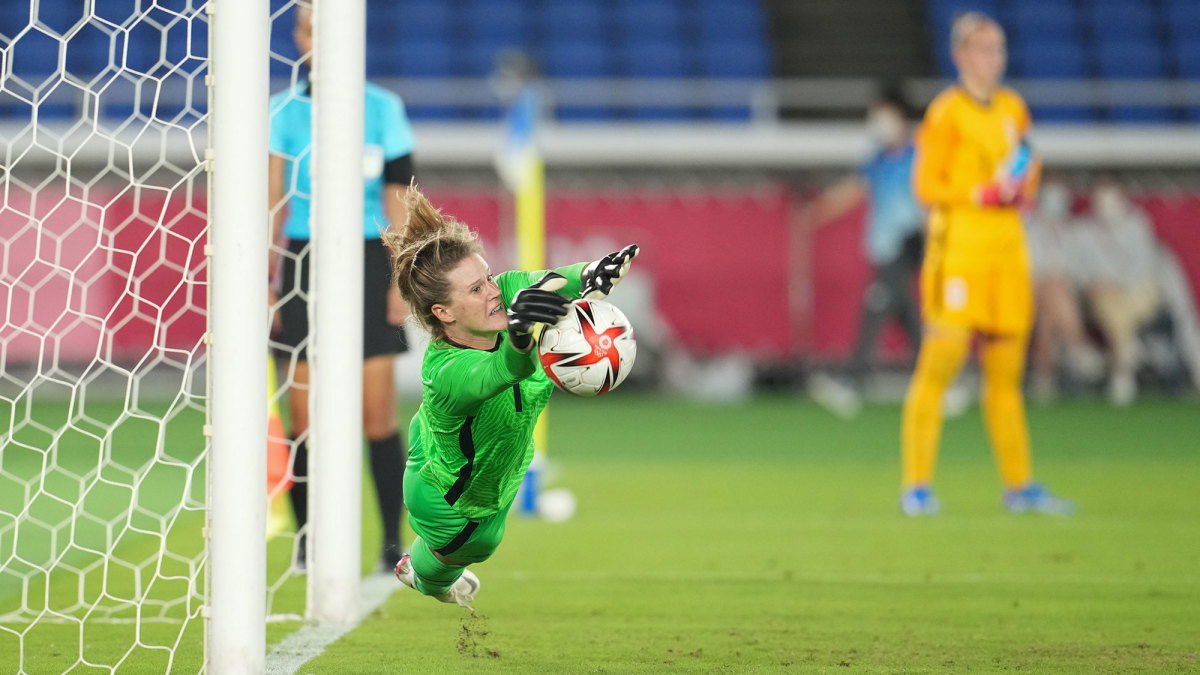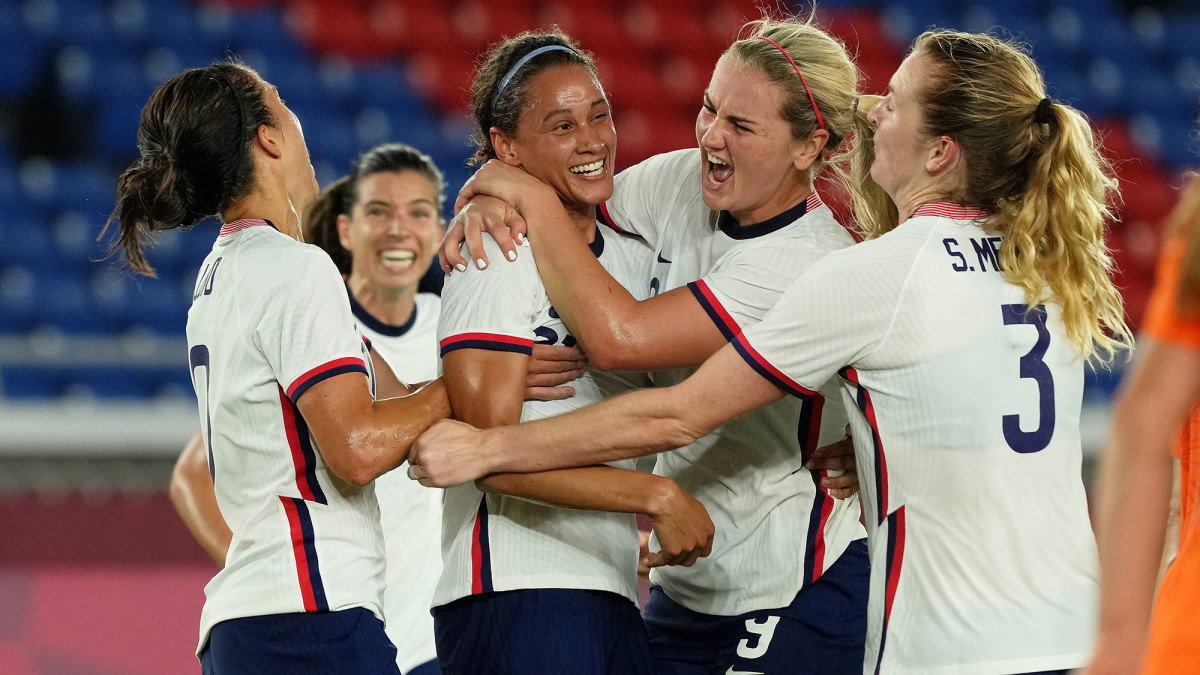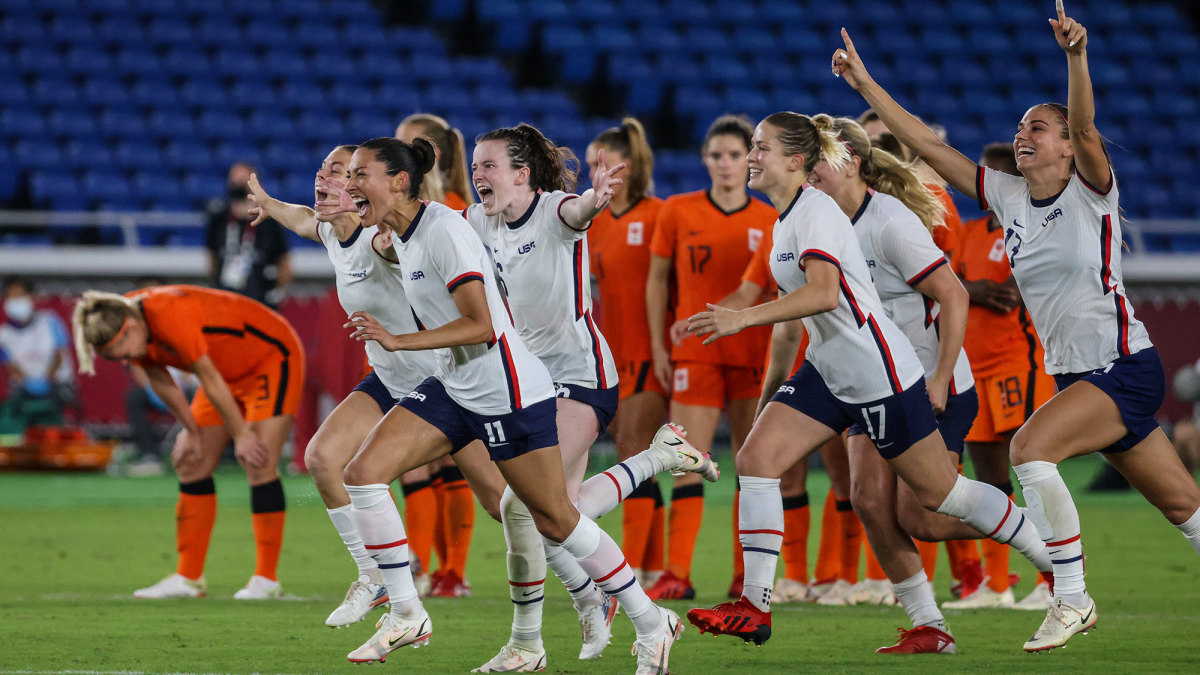Put on the Spot, USWNT's Alyssa Naeher Has Proved She Can Thrive
YOKOHAMA, Japan – Alyssa Naeher cannot win the gold medal herself. But damn, it sure felt like she could, didn’t it? With U.S. Olympic hopes on the line in the women's soccer tournament on Friday, Naeher kept finding herself in one of the most impossible positions in sports, goalkeeper facing a penalty kick—and again and again, she beat the house. Five penalties, including one potentially decisive one in regulation. Three saves. Insanity.
“That’s just absolutely ridiculous,” U.S. forward Alex Morgan said. “She’s out of this world.”
The U.S. beat the Netherlands in a shootout, 4–2 after a 2–2 draw, to move on to Monday's semifinal against Canada, and Naeher is far and away the biggest reason. As Megan Rapinoe said, “She's just been immense.” Naeher repeatedly helped the U.S. hang on during an otherwise lackluster second half, including a penalty save on Barcelona star Lieke Martens in the 81st minute. By the time this ended, she had made the whole team seem better, more cohesive, even younger.

She also made her coach look smarter. Vlatko Andonovski replaced the highly successful and not-always-beloved Jill Ellis after the 2019 Women's World Cup, and Andonovski is an extremely challenging spot: He is new and most of his most high-profile players are old (the average age of the U.S.'s Olympic roster is about 30). Andonovski benched Rapinoe, Morgan, Christen Press and Rose Lavelle to start the game. It was bold. But when it was tied 2–2 after extra time, guess who scored in the shootout?
“I’m sure you noticed, but those were the four players that scored on the penalty kicks,” he said.
Andonovski said a possible shootout was part of his thinking going in. He didn’t think it was realistic to ask those four to play 120 minutes if the game went that long. His decision to start Lynn Williams was extremely upsetting to people who will no longer admit it was extremely upsetting. Williams was an alternate when the team was first announced, before the IOC approved expanded rosters to include the four alternates, and here was Andonovski, starting her in an elimination game. But Williams was the U.S's best player in the first half, with a goal, an assist and an infusion of energy.

“I think that's what makes me special,” she said. “You know, we have a lot of people on the field who can work in tight spaces. But what makes me special is my ability to get in behind. So why change what I'm good at?”
If that sounds like a highly confident player, Rapinoe would approve. The 36-year-old American star has looked a step slow at times in Japan. But her sense of the moment remains. When the U.S. led the shootout 3-2 and Rapinoe had a chance to end it, she predictably went full Rapinoe: Scoring the game-winner, striking a cross-armed pose, smiling as her teammates ran toward her and then teasing the media afterward.
“You guys aren't surprised,” she said. “Come on!”
Um … a little surprised? By the U.S.'s own admission, this has not been the team's best tournament. At times it has looked old, sluggish, out of sync and quite literally off by a few inches.
The U.S. was called for offside six times in this game (compared to the Netherlands one), including three that nullified goals, which took its tally of rightly disallowed goals in Japan to nine. This has been a problem all tournament, and if the Dutch had won this game, that would have been a big part of the story. But since the U.S. won, it’s easy to look at it another way: Is this team closer to dominant than it has appeared?

Rapinoe said the U.S. had “a couple toenails offside.” Morgan had no explanation for why it keeps happening but a simple plan for how to fix it: Don’t be offside.
The tournament is down to the U.S., Canada, Sweden and Australia. The memory of Sweden's completely outplaying the U.S. in the Olympic opener remains fresh. But that was in group play. There remain two huge reasons to believe the U.S. can win gold: its performance under pressure and Naeher.
Five years ago in Brazil, the U.S. suffered a stunning shootout loss to Sweden that is remembered mostly for mercurial goalkeeper Hope Solo calling the Swedes “a bunch of cowards.” That was the end of Solo’s highly successful but emotionally exhausting run with the team. Naeher is the anti-Solo. As Rapinoe told the media, “She's not a person of many words, especially to you guys. She’ll probably never say anything to you guys.”
Does Naeher’s quiet nature matter? Let’s just say that in a pandemic Olympics, with no fans and nowhere to go, Naeher is a better fit than Solo would be. Rapinoe referred to “tough conditions, on and off the field … it’s a difficult tournament to go through.” An Olympic knockout-stage game that goes to penalty kicks in an empty stadium is a strange event—simultaneously very different from and exactly the same as if the joint were full. It was tense but it was eerie. In that situation, it’s good to have a leader who loves posing for teammates and a keeper who makes impressive saves and doesn’t want to talk.
Asked if this was her best game, Naeher, who also preserved the U.S.'s semifinal win at the 2019 Women's World Cup with a late penalty save vs. England, said, “I'll leave that to you guys. I don't know about any of that. I've said from the beginning, I just want to help my team win a gold medal.”
Help is an understatement. As Lavelle said, “She has saved us so many times. She’s the reason we’re still in this.”
More Olympics Coverage:
- Forde: Russian Doping Scandal Clouds the Pool in Japan
- Rosenberg: Olympic Pressure Can Change an Athlete
- Apstein: Under an Unexpected Spotlight, Suni Lee Shines
- Bishop: Surfing's Spirit Embodied by Sport's First Gold Medalist
